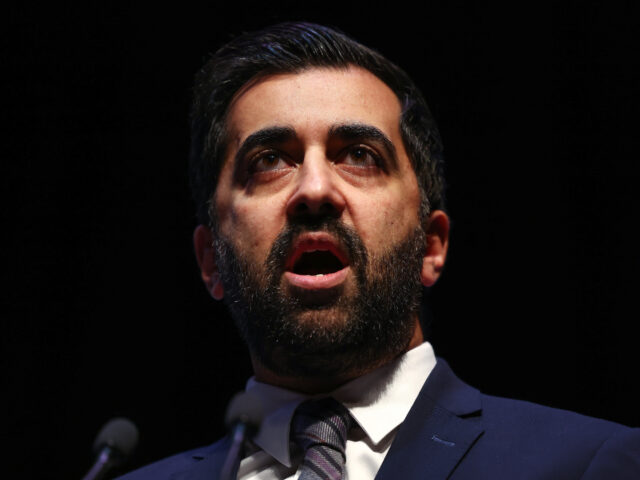Scottish First Minister Humza Yousaf is facing a political “apocalypse” as a survey showed support for his leftist-separatist Scottish National Party has fallen to its lowest level in a decade amid the chaotic rollout of his new hate speech law.
A poll conducted by YouGov amid the implementation of the deeply controversial and draconian speech restrictions showed that the Labour Party has surpassed Humza Yousaf’s Scottish National Party (SNP) for the first time since the 2014 Scottish Independence referendum, with 33 per cent of the public backing Labour in Westminster voting intention compared to 31 per cent for Yousaf’s SNP.
According to leading polling expert Sir John Curtice, the survey means that the SNP is on pace to only receive 18 seats in the UK parliament, a potentially disastrous decline from the 2019 general election when the separatist party had won 30 seats. Meanwhile, the Scottish branch of the left-wing Labour Party is predicted to win 28 seats in the northern British country. The Scottish Daily Express described the polling as indicating a potential “apocalypse” for Yousaf and his leftist party.
Meanwhile, the polling suggested that the SNP and Labour would each secure 43 seats in the 2026 Scottish Parliament elections, potentially jeopardising the Scottish National Party’s ability to maintain its grip on power over the locally devolved government, which it has held for nearly two decades.
Support for the far-left-nationalist-separatist party comes amid increasing anger over the “calamitous state” of the National Health Service (NHS) in Scotland as well as persistent scandals rocking the party, specifically surrounding corruption allegations, including the arrest of former SNP First Minister Nicola Sturgeon and her husband last year.
Separate polling has shown that 70 per cent of the Scottish public are in favour of ousting Yousaf and his government following “years of division and decline”. Furthermore, less than 30 per cent of respondents were in agreement with calling the current government “competent”
The poll was also conducted in part during the first days of the rollout of the Hate Crime and Public Order (Scotland) Act 2021, which came into force last Monday.
The imposition of the new speech restrictions, which criminalise “stirring up hatred” against certain protected groups with a penalty of up to seven years in prison, was mired in chaos from the very first day of its implementation as Harry Potter author J.K. Rowling openly defied the government and dared the police to arrest her for publicly declaring that several high-profile Scottish transgender individuals were, in fact, men.
Police Scotland, apparently reticent to lock up one of Scotland’s most prominent figures and international megastar author, announced that it would not criminally charge Rowling, despite insistence from SNP government ministers that “misgendering” would be a violation of the new speech restrictions.
The novel system has also been overrun with a deluge of reports, with the police revealing on Wednesday that it had received 7,152 complaints in the first week of the law, as Police Scotland said they would investigate all claims, which senior officers have warned will take away manpower from policing actual crimes.
However, this week the force admitted that only around 3 per cent of complaints were actually being investigated, with just 240 reports being looked at as hate speech offences.
The “vast majority” of complaints were reportedly made anonymously. The head of the Scottish Police Federation, which represents frontline officers, David Threadgold has claimed that many of the alleged hate speech reports made to police were from members of the public seeking to weaponise the law over personal grudges or to advance a political agenda.
Yousaf, the architect of the law, has attempted to claim that the opposition to the restrictions has only come from “right-wing” figures, including longtime liberals J.K. Rowling and American comedian Joe Rogan. However, a survey found that just 21 per cent of the public are supportive of the new law, compared to 45 per cent who believe that the anti-free speech legislation should be repealed.

COMMENTS
Please let us know if you're having issues with commenting.